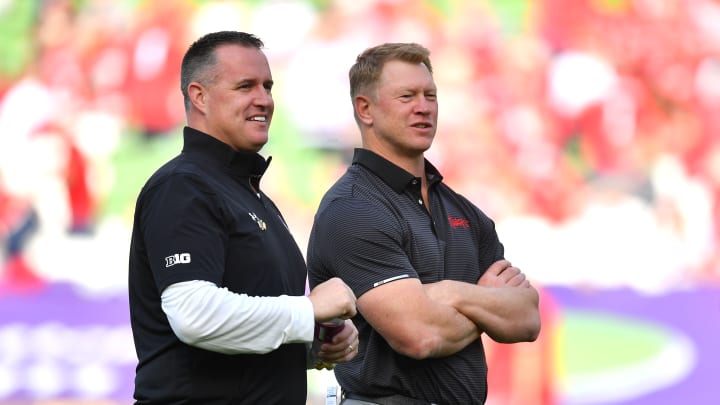Tad Stryker: The Fall of Frost and Fitz

When Scott Frost and Pat Fitzgerald met on the field in Dublin, Ireland, almost a year ago, it seemed inevitable that one of them would fall hard, and soon.
But both? Not likely. Fitzgerald seemed destined to lead Northwestern for at least another decade. After all, he had always shown a propensity to make life miserable for teams like Nebraska, who had more talent but less mental (and far too often, physical) toughness than Fitz and his scrappy Wildcats, whom he coached to a career .521 winning percentage, including 5-5 in bowl games.
The Northwestern series symbolized the self-inflicted difficulties of Nebraska football in the first dozen years of its Big Ten era, with the Huskers struggling to simply stay even at 6-6 against the NU from Evanston, Illinois. It all started with a rude wake-up call from the Wildcats in 2011, a butt-kicking for a top 10 all-time major college football program, administered by a basement-dweller whom many considered a 98-pound weakling. With Kain Colter leading the way, Northwestern outfought Bo Pelini’s Huskers by a deceptive 28-25 score in Memorial Stadium that November, outrushing Nebraska 207-122 and winning despite going minus-1 in turnovers. It was a bad omen, an embarrassing beginning to what has been a much closer series than it should be.
Don’t be too hard on Pelini, though; he won his next three over the Wildcats. Mike Riley went 1-2, and his 31-24 overtime loss on the Huskers’ home field in November 2017 ultimately sealed his doom. The Wildcats came into the contest already having been depleted by consecutive overtime games in the two previous weeks, but somehow had a lot more gas in the tank when it counted than did Riley’s crew. A lot more self-motivation, too.
The following year, Frost and his 2018 team coughed up a 14-point fourth-quarter lead in Evanston and lost in overtime again. It was the first of Frost’s three losses in five games against Fitzgerald.
Going into the 2022 season, everyone knew Frost was on the hottest of seats, but Fitzgerald seemed to be on solid footing with Northwestern, where he’d starred as a player and had more than his share of success as a coach. At one time, they both appeared to be high-character men who loved their alma maters, played by the rules, but struggled to win games. Fitzgerald had a better excuse; he was doing more with less, that much was obvious.
By last August, like many other Nebraskans, I had grown tired of Frost’s inability to develop talent, and I was finally starting to have serious doubts about his character. Despite my gradual awakening to the rank laziness and rot in Frost’s program — originating with a series of extremely bad decisions by Steve Pederson, Harvey Perlman and Shawn Eichorst — I had no reason to suspect anything amiss about Fitz. The character of the two-time consensus All-America linebacker and 2018 Big Ten Coach of the Year seemed to be above reproach.
Fitzgerald represented all that was good about a plucky little football program that generally punched above its weight despite having higher academic standards hampering his recruiting at an elite private institution — an institution he had several chances to leave for greener pastures had he desired. Patronizing, prideful Northwestern University, a charter member of the Big Ten, seemingly had everything it wanted to represent itself in its athletics program.
When Fitzgerald and Frost engaged in pregame chitchat in Aviva Stadium, who knew how much dysfunction was lurking beneath both programs? Well, that seems like a long time ago. Things are finally starting to look up in Lincoln, and not surprisingly, it’s mainly about character. It’s hard to overstate how encouraging it is to hear that Zavier Betts, formerly alienated from the Husker football program, has decided to return, in large part because he believes new head coach Matt Rhule cares about him as a person off the field as much as his athletic ability on the field.
I’ll always wonder two things about Northwestern football under Fitzgerald. Was defensive coordinator Mike Hankwitz the real reason for the Wildcats’ overachieving ways? And did Fitz really believe that vile, sexual-themed hazing actually helped accomplish anything positive in his program, or did he simply chose to look the other way for reasons I cannot fathom? Northwestern generally beat Nebraska because it used the same strategy the rest of the Western Division did: play conservative football and wait for Nebraska to screw up and beat itself. Now Northwestern has gone and shot itself in the foot, and who knows how far upward into the leadership structure at Evanston that report will reverberate?
Nebraska is hopefully in the final stages of its inexorable and imperative upheaval, which may be quite tame compared to what Northwestern is about to experience in the coming months. And the Huskers appear to have landed on their feet, because Athletic Director Trev Alberts has made an excellent choice in Rhule, who after seven months on the job, exudes authenticity. He will be judged by his record on the field, and he will no doubt make enemies as Nebraska’s head coach (even Tom Osborne had his share of detractors), but at this point, Rhule appears to have a work ethic, a plan and a coaching staff that will lead Nebraska football back to solid ground.
So imagine, Nebraska football finally having a coaching advantage over Northwestern. Believe me, I couldn’t have imagined writing that sentence two decades ago, not with a straight face.
